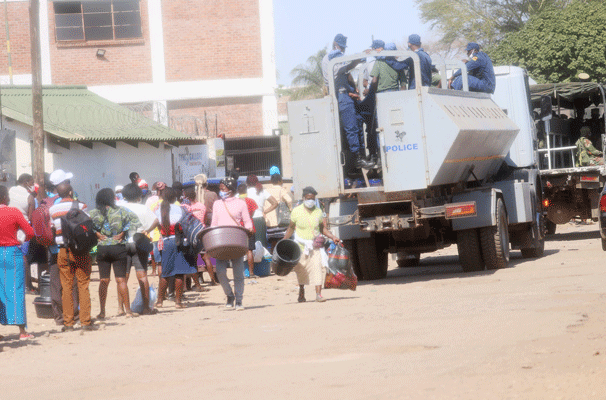
By Clandestine Mupangani
On January 5, 2021, government proclaimed a 30-day level-four national lockdown, which was in response to the Covid-19 second wave which had hit the country very hard.
On January 29, the lockdown was further extended by another two weeks, meaning that it will now run up to tomorrow. With women and girls constituting 52% of the total population in Zimbabwe, and 67,7% of the total population in Zimbabwe under the age of 35 years, this paper explores the implications of the latest national lockdown on young people, especially young women.
It further proposes measures the government can take to help mitigate the implications of the pandemic-induced lockdown on the lives of Zimbabwean youth.
One of the measures taken under the second national lockdown was the banning of all forms of informal trading, including the controversial informal street trading from which thousands of young people (mostly young women) eke their living.
To further show the economic vulnerability of young people, a 2019 national survey by the Youth Empowerment and Transformation Trust (YETT) highlighted that only 7% of the youth population in Zimbabwe was formally employed. As a result of the restriction in business operations nationwide, many youth-led micro, small to medium-scale businesses have succumbed to liquidation.
Furthermore, because of the absence of social safety nets such as income or social support grants from government, most informal sector traders including women and youth have been playing cat-and-mouse games with municipal and state security agents as they have been defying the set lockdown regulations by returning to their informal vending sites.
By doing so, informal traders have become vulnerable to contracting Covid-19 in the absence of personal protective equipment (PPE)Â and running water at their vending sites.
- Chamisa under fire over US$120K donation
- Mavhunga puts DeMbare into Chibuku quarterfinals
- Pension funds bet on Cabora Bassa oilfields
- Councils defy govt fire tender directive
Keep Reading
The recent lockdown has resulted in a halt in the education sector. Every scholar from secondary to tertiary level is struggling in the “online learning” era. Schools are only open for students writing final examinations and the rest are learning from home.
This measure, however, does not take into account students in the remote areas of the country who have no access to the internet and other basic learning resources. The lockdown has resulted in delays in the period in which students must have completed their studies. E- learning systems are availed to scholars with inadequate resources to participate in the learning process leading to a fall in the education standards
The sways of the lockdown will continue to be felt most severely by young people living in challenging and or underprivileged circumstances. These include but are not limited to young people in high-density and informal settlements short of access to running water and health services, young people undergoing homelessness, young people living with disabilities, adolescent girls and young women who suffer from gender-based disparities and young people living with chronic health conditions. The lockdown has resulted in a “go-slow” work mode for most service providers who can be of assistance to young people in the country resulting in the youth leading impoverished lives.
Going forward, the government should work towards funding youth-led businesses and organisations including adolescent-led organisations and young women cooperatives.
The funding streams should be dependable, translucent, constant and flexible. This can be done through streamlining processes for applications and transfer of funds through using google forms for instance.
The involvement of young people in the funding allocation process will be more effective as young people will discuss the problems directly affecting their businesses. Affiliating with youth-led organisations and businesses will help in ensuring the management and reporting of resources. Forming inter-agency tools to track funding allocated to youth priorities and youth groups and encouraging within agencies and among donors for increasing funding were a lacuna exists.
A step towards advocating for the inclusion of young people in coordination mechanisms where funding decisions are made will be a proactive move which the government should consider. This can be done through extending invitations for coordination meetings with youth groups and their networks.
Mentoring youth groups participating in coordination mechanisms to take part in assessments, information-sharing and proposal plans can act as a complementary step towards advocating for the inclusion of young people.
The government can co-design programmes and pitches with youth-led businesses where possible to consist of a budget for their projects in agency budgets. Wherever possible, the government can offer youth groups lump sums that include overhead, staffing and contingency funding as well as activity costs. This can be done together with providing mentoring and support in identified and agreed-upon programmatic and operational areas that will help youth groups deliver programmes.
Amid the lockdown, the government can build the capacity of, and support, youth-led organisations to be involved in the Covid-19 response management with other humanitarian players on a voluntary basis. No youth is to be left behind therefore everyone no matter their area of expertise will play an active role in the fight against Covid-19.
Capacity-building resources can be pooled together and delivered remotely. Capacity-building topics might include but not be limited to refuting misconceptions, rumours and myths conveyed offline and online and discrimination related to the virus and how youths can be responsible citizens, including the basics of online safety and incident-reporting pathways.
- Clandestine Mupangani is a 2020 YETT Youth Leadership Development Course alumnus. She writes here in her personal capacity and can be contacted at:Â [email protected]











